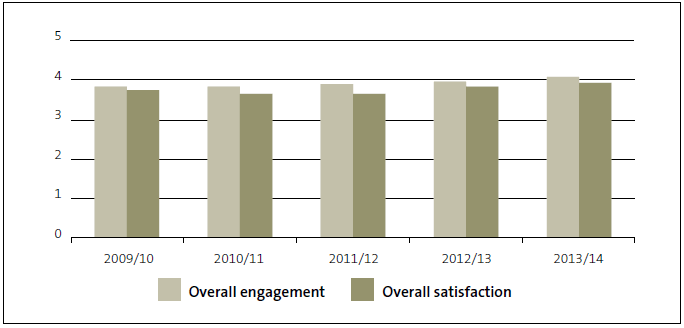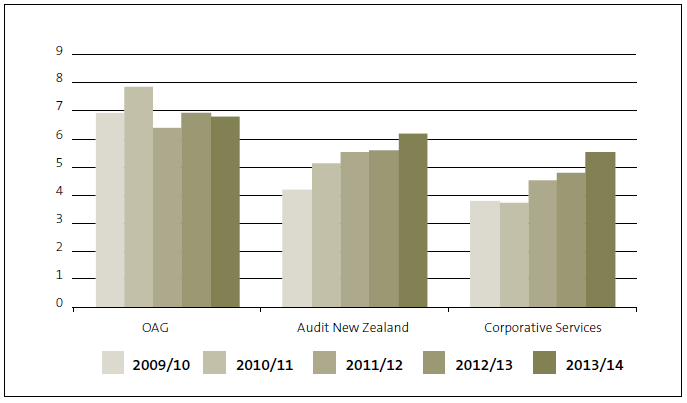Part 3: Organisational health and capability
We place high importance on having a strong foundation of skilled people working together in a well-run organisation.
Our people
We are committed to an organisational culture where our people are supported and have the capability and opportunity to do their best work. We take joint responsibility with our people for building capability and strengthening their contribution to the Office and to the public sector. The Office seeks to provide our people with a supportive and rewarding place to work.
Equal employment opportunities
Our equal employment opportunities programme is designed to enable us to continue to attract and appoint people, who have the appropriate skills, values, and attributes to meet the Office's needs, and strategic direction. The principles and practice of Equal Employment Opportunities are embedded in our human resources policies. We consider that we have continued to give effect to those principles during the year.
We monitor our recruitment and employment decisions and practices. Our managers are made aware of, and given support to fulfil, our good employer obligations, through specific programmes, courses, and one-on-one coaching. Details about staff numbers and staff diversity between 2011 and 2014 are available on our website.
Building our staff capability
We focus on improving every staff member's skills, as identified in our competency frameworks. We continue our focus on our leadership development programmes, and on improving our staff's engagement (as measured by our annual staff engagement survey). Our average staff engagement scores throughout the organisation increased from 2012/13.
Our audit staff have consistently performed well in the New Zealand Institute of Chartered Accountants (NZICA) final accreditation examinations. In 2013/14, we again achieved a 100% pass rate.
Information systems
Our work involves intensive use of information. We rely on information systems to support this work. Our audit teams in the field use specialist auditing software (TeamMate) and remote access tools.
We recognise the significance of the information and insights that the Auditor-General, her Appointed Auditors and their staff gather as they work, and we are committed to using this to help improve the public sector's performance. To improve the collection, analysis, sharing, and reporting of this information, we put the second phase of an enterprise content management system, which we call the Source, into effect in 2013/14. We intend to continue work on this system in 2014/15.
We began putting into effect a Business Intelligence platform, which we plan to use to analyse the various datasets that our auditors collect. Our objective is to use this platform to better understand risks and issues throughout the public sector, and continue our reporting about these.
Facilities
In 2013/14, we completed our long-term property project in Christchurch. After more than two years in makeshift facilities, our Christchurch staff now have a permanent and suitable office.
Contact details for our offices are available on the OAG and Audit New Zealand websites.

2013/14 results and previous performance for organisational health and capability
| Measure | Result | Comment |
| Staff are engaged and satisfied | ||
| Improve (or at least maintain) the engagement and satisfaction of our staff measured against the previous two years. | Achieved | The Office's staff engagement survey is based on responses to statements on a 5-point scale, with "1" being the lowest score and "5" being the highest. Our survey results show increases in both overall engagement (4.03) and satisfaction (3.89) when measured against the previous two years. The increase in Audit New Zealand's results for engagement (4.06) and satisfaction (3.93) were particularly encouraging. |
Figure 15
Overall staff engagement and satisfaction scores, 2009/10 to 2013/14

| Improve (or at least maintain) the average years of experience of our staff measured against the previous two years. | Achieved | Our results improved for Audit New Zealand (6.2 years) and Corporate Services (5.5 years). Results for OAG (6.7 years) improved when measured against the average of the previous two years. |
Figure 16
Average numbers of years staff have been employed by the Office, 2009/10 to 2013/14

| Staff turnover | No target set | Overall, we are comfortable with a turnover of up to 20%, but would prefer no more than 15%. This year's turnover was 14.6%, a reduction on the 17.4% in 2012/13. |
| Audit staff have high levels of expertise | ||
| Achieve a pass rate of at least 95% for staff undertaking accreditation examinations. | Achieved | This year, we achieved a 100% pass rate for the NZICA final accreditation examinations. We have consistently achieved a pass rate of more than 95% since 2009/10. |
Client survey feedback shows that our audit staff's knowledge of entities' business and operating context is improving, and that our auditors are investing in work to understand that context. Our clients give us improved (or at least maintained) ratings (on a scale of 1 to 10) compared with the previous two years for their auditors':
|
Achieved | In 2013/14, a sample of public entities rated Audit New Zealand the same or better in all aspects compared with the previous two years: Ability to understand the business and risks 2013/14 – 7.5 2012/13 – 7.5 2011/12 – 7.3 General skills and knowledge 2013/14 – 7.5 2012/13 – 7.4 2011/12 – 7.2 Information to improve 2013/14 – 6.8 2012/13 – 6.5 2011/12 – 6.4 |
| Audit staff have high levels of expertise: Auditing performance information | ||
| Our quality assurance reviews of our audit and assurance work confirms that auditors are carrying out the requirements of AG-4 (Revised). AG-4 (Revised) is the Auditor-General's auditing standard on auditing service performance information. |
Partially achieved | Quality assurance reviews of our audit and assurance work found auditors are generally meeting the requirements of AG-4 (Revised). The reviews have made recommendations about some areas where compliance can be improved. These related to the assessment of whether the forecast non-financial performance information provides an adequate basis for reporting service performance information, and the assessment process used for identifying the material performance information for auditing. |
